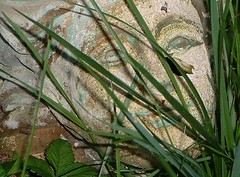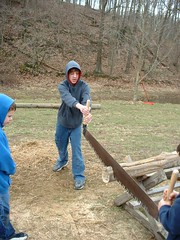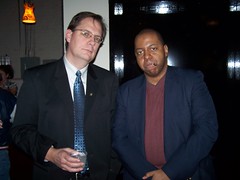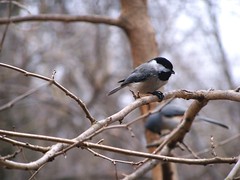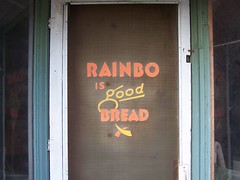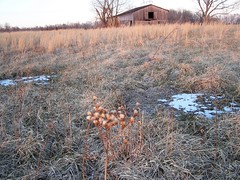Donna and I got to hear the wonderful Mitch Barrett in concert this last Friday. He did a beautiful job and I was especially moved by this old song of his. The greening of the yard, I suppose.
Sacred Yard, by Mitch Barrett
Outside in my front yard
I’ve got a plastic rooster and a Noah’s Ark
camel bells from a foreign land
crystal ball on a terra cotta stand
Jesus’ cross is hanging on a tree,
Tibetan prayer flags blowin’ in the breeze
rub my lucky yard gnome as you walk past
my concrete Buddha laughin’ in the grass
chorus:
Wipe your feet before you step from your car
you’re on hallowed ground you're in my sacred yard
Holy Water in the birdbath to wash your sins
now you’re forgiven, come on in
Got a silver star of David and a stained glass moon
sentimental objects hanging in my room
everything is sacred every breath of air
be careful what you’re thinking, every thoughts a prayer
It’s the ordinary people you talk to every day
incantations and prophecies from the mouths of babes
you can talk about the weather or the food you crave
it’s the feelings you project
and not the words you say
chorus:
Wipe your feet before you step from your car
you’re on hallowed ground you're in my sacred yard
Holy Water in the birdbath to wash your sins
now you’re forgiven,
and I'm forgiven,
we're all forgiven
come on in
You can listen to it and other songs at his website if you're so inclined.
Saturday, March 31, 2007
Thursday, March 29, 2007
Watchful
“If Congress fails to pass a bill to fund our troops on the front lines, the American people will know who to hold responsible…”
~George W. Bush
But that’s the problem for Mr. Bush, isn’t it? We, the people, know exactly who to hold responsible for the quagmire in Iraq.
Natural consequences are never fun when we’ve made poor decisions.
~George W. Bush
But that’s the problem for Mr. Bush, isn’t it? We, the people, know exactly who to hold responsible for the quagmire in Iraq.
Natural consequences are never fun when we’ve made poor decisions.
Sunday, March 25, 2007
A Midwinter Orange?
As we began looking at Bill McKibben's book, Deep Economy a couple of posts ago, I suggested that it looked like McKibben was setting up to suggest that our way of life is not sustainable. That we have "prospered" and been able to produce food for the ~7 billion of us only because of cheap fossil fuels and water.
But as time goes on, as the population continues to increase, and, as affordable fossil fuels and water begin to run out (whether that's sooner - ten years or less, or later - 100 years from now), both water and petroleum will go up in cost. Lacking affordable water and petrol - the two resources on which our economy is based - what will become of us?
McKibben addresses this, saying:
The "food system" has been made over in the name of efficiency and growth as much as any other: the average bite of food an American eats has traveled fifteen hundred miles [!! -dan] before it reaches her lips.
The self-sufficient all-around farms with which the colonists covered the continent have largely disappeared, at least outside of Amish country...
This being the case, one must wonder what happens when affordable petroleum goes away? If we can no longer purchase food from the other side of the world, will we be able to begin to produce and buy locally again?
We all know that the Industrialists will say, "Well, something will just replace petroleum - we'll still get our stuff..." even though no such replacement exists. But short of some answer to, "Where?," I have a difficult time taking such misplaced starry-eyed optimism seriously.
So, are we ready for winters without oranges or strawberries? Or will global climate change mean that we'll be able to grow oranges and year-round strawberries in our now-temperate zones?
Is there some reason to assume that it's not a big deal that we won't be able to buy food from around the world?
But as time goes on, as the population continues to increase, and, as affordable fossil fuels and water begin to run out (whether that's sooner - ten years or less, or later - 100 years from now), both water and petroleum will go up in cost. Lacking affordable water and petrol - the two resources on which our economy is based - what will become of us?
McKibben addresses this, saying:
The "food system" has been made over in the name of efficiency and growth as much as any other: the average bite of food an American eats has traveled fifteen hundred miles [!! -dan] before it reaches her lips.
The self-sufficient all-around farms with which the colonists covered the continent have largely disappeared, at least outside of Amish country...
This being the case, one must wonder what happens when affordable petroleum goes away? If we can no longer purchase food from the other side of the world, will we be able to begin to produce and buy locally again?
We all know that the Industrialists will say, "Well, something will just replace petroleum - we'll still get our stuff..." even though no such replacement exists. But short of some answer to, "Where?," I have a difficult time taking such misplaced starry-eyed optimism seriously.
So, are we ready for winters without oranges or strawberries? Or will global climate change mean that we'll be able to grow oranges and year-round strawberries in our now-temperate zones?
Is there some reason to assume that it's not a big deal that we won't be able to buy food from around the world?
Wednesday, March 21, 2007
Pinecone Swirl
More quotes...
Climb the mountains and get their good tidings. Nature's peace will flow into you as sunshine flows into trees. The winds will blow their own freshness into you, and the storms their energy, while cares will drop off like autumn leaves.
John Muir
We call upon the waters that rim the earth, horizon to horizon, that flow in our rivers and streams, that fall upon our gardens and fields, and we ask that they teach us and show us the way.
Chinook Blessing
Let the rain kiss you.
Let the rain beat upon your head with silver liquid drops.
Let the rain sing you a lullaby.
Langston Hughes
We learn from our gardens to deal with the most urgent question of the time: How much is enough?
Wendell Berry
You care for the land and water it; you enrich it abundantly. The streams of God are filled with water to provide the people with grain, for so you have ordained it. You drench its furrows and level its ridges; you soften it with showers and bless its crops. You crown the year with your bounty, and your carts overflow with abundance. The grasslands of the desert overflow; the hills are clothed with gladness. The meadows are covered with flocks and the valleys are mantled with grain; they shout for joy and sing.
Psalm 65:9-13
Climb the mountains and get their good tidings. Nature's peace will flow into you as sunshine flows into trees. The winds will blow their own freshness into you, and the storms their energy, while cares will drop off like autumn leaves.
John Muir
We call upon the waters that rim the earth, horizon to horizon, that flow in our rivers and streams, that fall upon our gardens and fields, and we ask that they teach us and show us the way.
Chinook Blessing
Let the rain kiss you.
Let the rain beat upon your head with silver liquid drops.
Let the rain sing you a lullaby.
Langston Hughes
We learn from our gardens to deal with the most urgent question of the time: How much is enough?
Wendell Berry
You care for the land and water it; you enrich it abundantly. The streams of God are filled with water to provide the people with grain, for so you have ordained it. You drench its furrows and level its ridges; you soften it with showers and bless its crops. You crown the year with your bounty, and your carts overflow with abundance. The grasslands of the desert overflow; the hills are clothed with gladness. The meadows are covered with flocks and the valleys are mantled with grain; they shout for joy and sing.
Psalm 65:9-13
Star Moss
Spring is nearly upon us. I thought I'd share some photos of the emerging spring in my neck of the woods, along with some quotes to get you in the mood for rebirth.
It is not enough to fight for the land; it is even more important to enjoy it. While you can. While it's still here. So get out there and hunt and fish and mess around with your friends, ramble out yonder and explore the forests, encounter the grizz, climb the mountains, bag the peaks, run the rivers, breathe deep of that yet sweet and lucid air, sit quietly for awhile and contemplate the precious stillness, that lovely, mysterious and awesome space… and I promise you this one sweet victory over our enemies, over those desk-bound people with their hearts in a safe deposit box and their eyes hypnotized by desk calculators. I promise you this: You will outlive the bastards.
Edward Abbey
To me a lush carpet of pine needles or spongy grass is more welcome than the most luxurious Persian rug.
Helen Keller
Cultivate poverty like a garden herb, like sage. Do not trouble yourself much to get new things, whether clothes or friends. Turn the old; return to them. Things do not change; we change. The very simplicity and nakedness of man's life in the primitive ages imply this advantage, at least, that they left him still but a sojourner in nature. To be awake is to be alive. Time is but the stream I go a-fishing in.
Henry David Thoreau
It is not enough to fight for the land; it is even more important to enjoy it. While you can. While it's still here. So get out there and hunt and fish and mess around with your friends, ramble out yonder and explore the forests, encounter the grizz, climb the mountains, bag the peaks, run the rivers, breathe deep of that yet sweet and lucid air, sit quietly for awhile and contemplate the precious stillness, that lovely, mysterious and awesome space… and I promise you this one sweet victory over our enemies, over those desk-bound people with their hearts in a safe deposit box and their eyes hypnotized by desk calculators. I promise you this: You will outlive the bastards.
Edward Abbey
To me a lush carpet of pine needles or spongy grass is more welcome than the most luxurious Persian rug.
Helen Keller
Cultivate poverty like a garden herb, like sage. Do not trouble yourself much to get new things, whether clothes or friends. Turn the old; return to them. Things do not change; we change. The very simplicity and nakedness of man's life in the primitive ages imply this advantage, at least, that they left him still but a sojourner in nature. To be awake is to be alive. Time is but the stream I go a-fishing in.
Henry David Thoreau
Saturday, March 17, 2007
Can't Buy Me Love
From Jesus’ words on a different sort of economy, I’d like to move on to Bill McKibben’s thoughts on the same. McKibben has just released a book called Deep Economy that I’ve just begun reading and will likely be posting on in the coming days.
The gist of McKibben’s book is that there are three problems with our System as it exists.
1. It’s not sustainable
2. It’s not healthy
3. And even if it were either of these, it’s not working to make us happy
And it is this third point that he seems to focus on, at least in the initial pages. A few excerpts from the first chapter, where he is asking the question: Is more better?
In some sense, you could say that the years since WWII in America have been a loosely controlled experiment designed to answer this very question…in 1991 the average American family owned twice as many cars, drove two and a half times as far, used twenty-one times as much plastic, and traveled twenty-five times further by air than did the average family in 1951…the size of new houses has doubled since 1970, even as the average number of people in each one has shrunk…
And on McKibben goes, listing how much more Stuff we have and use and waste. He goes on to quote conservative writer Dinesh D’Souza who said that we have created not just the first middle class, but “the first mass affluent class in world history.”
To which, many of us would be inclined to think, “Well, that sounds like a good thing, right?” Maybe not.
McKibben then points out that, despite all this Stuff, we are less happy.
In 1946, the United States was the happiest country among four advanced economies; thirty years later, it was eighth among eleven advanced countries; a decade after that it ranked tenth among twenty-three nations, many of them from the third world…The percentage of respondents saying they were very happy peaked sometime in the 1950s and has slid slowly but steadily in the years since…
That’s not to say that getting richer caused these problems, only that it didn’t alleviate them. All in all, we have more stuff and less happiness. The experiment we’ve undertaken has yielded a significant, robust, and largely unexpected result.[emphasis, his]
Of course, between these quotes, he has offered much resourced material to support his claims and his approaching conclusion. That conclusion being:
The answer is interesting for what it says about human nature. Up to a certain point, none of what I’ve just said holds true. Up to a certain point, more really does equal better. [emphasis, his]…
And it wasn’t, as it turns out, just my anectdotal impression. In general, researchers report that money consistently buys happiness right up to about $10,000 per capita income, and that after that point the correlation disappears disappears.[emphasis, his]
That’s enough for now. I apologize because I’m almost certainly not doing justice to all the researched and reasoned commentary McKibben offers, but hopefully you get the idea.
His point is that being desperately poor and unable to feed yourself is miserable. But once you’ve reached that $10,000 annual amount, you’ve reached the zenith of happiness that money can buy.
You buy that?
The gist of McKibben’s book is that there are three problems with our System as it exists.
1. It’s not sustainable
2. It’s not healthy
3. And even if it were either of these, it’s not working to make us happy
And it is this third point that he seems to focus on, at least in the initial pages. A few excerpts from the first chapter, where he is asking the question: Is more better?
In some sense, you could say that the years since WWII in America have been a loosely controlled experiment designed to answer this very question…in 1991 the average American family owned twice as many cars, drove two and a half times as far, used twenty-one times as much plastic, and traveled twenty-five times further by air than did the average family in 1951…the size of new houses has doubled since 1970, even as the average number of people in each one has shrunk…
And on McKibben goes, listing how much more Stuff we have and use and waste. He goes on to quote conservative writer Dinesh D’Souza who said that we have created not just the first middle class, but “the first mass affluent class in world history.”
To which, many of us would be inclined to think, “Well, that sounds like a good thing, right?” Maybe not.
McKibben then points out that, despite all this Stuff, we are less happy.
In 1946, the United States was the happiest country among four advanced economies; thirty years later, it was eighth among eleven advanced countries; a decade after that it ranked tenth among twenty-three nations, many of them from the third world…The percentage of respondents saying they were very happy peaked sometime in the 1950s and has slid slowly but steadily in the years since…
That’s not to say that getting richer caused these problems, only that it didn’t alleviate them. All in all, we have more stuff and less happiness. The experiment we’ve undertaken has yielded a significant, robust, and largely unexpected result.[emphasis, his]
Of course, between these quotes, he has offered much resourced material to support his claims and his approaching conclusion. That conclusion being:
The answer is interesting for what it says about human nature. Up to a certain point, none of what I’ve just said holds true. Up to a certain point, more really does equal better. [emphasis, his]…
And it wasn’t, as it turns out, just my anectdotal impression. In general, researchers report that money consistently buys happiness right up to about $10,000 per capita income, and that after that point the correlation disappears disappears.[emphasis, his]
That’s enough for now. I apologize because I’m almost certainly not doing justice to all the researched and reasoned commentary McKibben offers, but hopefully you get the idea.
His point is that being desperately poor and unable to feed yourself is miserable. But once you’ve reached that $10,000 annual amount, you’ve reached the zenith of happiness that money can buy.
You buy that?
Tuesday, March 13, 2007
Jesus on Economics and Religion, Part 2
Luke 12:16-34
And He told them a parable, saying, "The land of a rich man was very
productive.
"And he began reasoning to himself, saying, 'What shall I do, since
I have no place to store my crops?'
"Then he said, 'This is what I will do: I will tear down my barns
and build larger ones, and there I will store all my grain and my
goods. 'And I will say to my soul, "Soul, you have many goods laid up for many years to come; take your ease, eat, drink and be merry."'
"But God said to him, 'You fool! This very night your soul is
required of you; and now who will own what you have prepared?'
"So is the man who stores up treasure for himself, and is not rich
toward God."
And He said to His disciples, "For this reason I say to you, do not
worry about your life, as to what you will eat; nor for your body, as
to what you will put on.
"For life is more than food, and the body more than clothing.
"Consider the ravens, for they neither sow nor reap; they have no
storeroom nor barn, and yet God feeds them; how much more valuable you are than the birds!
"And which of you by worrying can add a single hour to his life's
span?
"If then you cannot do even a very little thing, why do you worry
about other matters?
"Consider the lilies, how they grow: they neither toil nor spin; but
I tell you, not even Solomon in all his glory clothed himself like one
of these.
"But if God so clothes the grass in the field, which is alive today
and tomorrow is thrown into the furnace, how much more will He clothe you? You men of little faith!
"And do not seek what you will eat and what you will drink, and do
not keep worrying.
"For all these things the nations of the world eagerly seek; but
your Father knows that you need these things.
"But seek His kingdom, and these things will be added to you.
"Do not be afraid, little flock, for your Father has chosen gladly
to give you the kingdom.
"Sell your possessions and give to charity; make yourselves money
belts which do not wear out, an unfailing treasure in heaven, where no thief comes near nor moth destroys.
"For where your treasure is, there your heart will be also."
The Word of the Lord.
Thoughts? Comments? Cutting remarks?
And He told them a parable, saying, "The land of a rich man was very
productive.
"And he began reasoning to himself, saying, 'What shall I do, since
I have no place to store my crops?'
"Then he said, 'This is what I will do: I will tear down my barns
and build larger ones, and there I will store all my grain and my
goods. 'And I will say to my soul, "Soul, you have many goods laid up for many years to come; take your ease, eat, drink and be merry."'
"But God said to him, 'You fool! This very night your soul is
required of you; and now who will own what you have prepared?'
"So is the man who stores up treasure for himself, and is not rich
toward God."
And He said to His disciples, "For this reason I say to you, do not
worry about your life, as to what you will eat; nor for your body, as
to what you will put on.
"For life is more than food, and the body more than clothing.
"Consider the ravens, for they neither sow nor reap; they have no
storeroom nor barn, and yet God feeds them; how much more valuable you are than the birds!
"And which of you by worrying can add a single hour to his life's
span?
"If then you cannot do even a very little thing, why do you worry
about other matters?
"Consider the lilies, how they grow: they neither toil nor spin; but
I tell you, not even Solomon in all his glory clothed himself like one
of these.
"But if God so clothes the grass in the field, which is alive today
and tomorrow is thrown into the furnace, how much more will He clothe you? You men of little faith!
"And do not seek what you will eat and what you will drink, and do
not keep worrying.
"For all these things the nations of the world eagerly seek; but
your Father knows that you need these things.
"But seek His kingdom, and these things will be added to you.
"Do not be afraid, little flock, for your Father has chosen gladly
to give you the kingdom.
"Sell your possessions and give to charity; make yourselves money
belts which do not wear out, an unfailing treasure in heaven, where no thief comes near nor moth destroys.
"For where your treasure is, there your heart will be also."
The Word of the Lord.
Thoughts? Comments? Cutting remarks?
Monday, March 12, 2007
Doin' Justice...
My church is part of an organization (started by members of my church) called CLOUT - Citizens of Louisville Organized and United Together. It is a Direct Action justice group.
We have a great Op-Ed piece in the local paper today. Check it out:
http://jeffstreet.blogspot.com/2007/03/doin-justice.html
We have a great Op-Ed piece in the local paper today. Check it out:
http://jeffstreet.blogspot.com/2007/03/doin-justice.html
Jesus on Economics and Religion
As a follow up to some earlier comments, I thought I'd post Luke 12, in which Jesus makes some strong commentary on religious and economic issues. While we shy away from controversies like this in most polite company, Jesus certainly didn't - nor did he mince words.
The first part of Luke 12:
Under these circumstances, after so many thousands of people had gathered together that they were stepping on one another, He began saying to His disciples first of all, "Beware of the leaven of the
Pharisees, which is hypocrisy.
"But there is nothing covered up that will not be revealed, and hidden that will not be known.
"Accordingly, whatever you have said in the dark will be heard in the
light, and what you have whispered in the inner rooms will be proclaimed upon the housetops.
"I say to you, My friends, do not be afraid of those who kill the body and after that have no more that they can do.
"But I will warn you whom to fear: fear the One who, after He has killed, has authority to cast into hell; yes, I tell you, fear Him!
"Are not five sparrows sold for two cents? Yet not one of them is
forgotten before God.
"Indeed, the very hairs of your head are all numbered. Do not fear;
you are more valuable than many sparrows.
"And I say to you, everyone who confesses Me before men, the Son of Man will confess him also before the angels of God; but he who denies Me before men will be denied before the angels of God.
"And everyone who speaks a word against the Son of Man, it will be forgiven him; but he who blasphemes against the Holy Spirit, it will
not be forgiven him.
"When they bring you before the synagogues and the rulers and the authorities, do not worry about how or what you are to speak in your defense, or what you are to say; for the Holy Spirit will teach you in that very hour what you ought to say."
Someone in the crowd said to Him, "Teacher, tell my brother to
divide the family inheritance with me."
But He said to him, "Man, who appointed Me a judge or arbitrator
over you?"
Then He said to them, "Beware, and be on your guard against every form of greed; for not even when one has an abundance does his life consist of his possessions."
======
Thoughts?
The first part of Luke 12:
Under these circumstances, after so many thousands of people had gathered together that they were stepping on one another, He began saying to His disciples first of all, "Beware of the leaven of the
Pharisees, which is hypocrisy.
"But there is nothing covered up that will not be revealed, and hidden that will not be known.
"Accordingly, whatever you have said in the dark will be heard in the
light, and what you have whispered in the inner rooms will be proclaimed upon the housetops.
"I say to you, My friends, do not be afraid of those who kill the body and after that have no more that they can do.
"But I will warn you whom to fear: fear the One who, after He has killed, has authority to cast into hell; yes, I tell you, fear Him!
"Are not five sparrows sold for two cents? Yet not one of them is
forgotten before God.
"Indeed, the very hairs of your head are all numbered. Do not fear;
you are more valuable than many sparrows.
"And I say to you, everyone who confesses Me before men, the Son of Man will confess him also before the angels of God; but he who denies Me before men will be denied before the angels of God.
"And everyone who speaks a word against the Son of Man, it will be forgiven him; but he who blasphemes against the Holy Spirit, it will
not be forgiven him.
"When they bring you before the synagogues and the rulers and the authorities, do not worry about how or what you are to speak in your defense, or what you are to say; for the Holy Spirit will teach you in that very hour what you ought to say."
Someone in the crowd said to Him, "Teacher, tell my brother to
divide the family inheritance with me."
But He said to him, "Man, who appointed Me a judge or arbitrator
over you?"
Then He said to them, "Beware, and be on your guard against every form of greed; for not even when one has an abundance does his life consist of his possessions."
======
Thoughts?
Wednesday, March 7, 2007
Chipmunk
After 10 days of deliberating, a jury convicted Libby on four counts of lying and obstructing an investigation into how former CIA operative Valerie Plame's name was leaked to reporters after the U.S. invasion of Iraq in 2003.
Portrayed by defence lawyers as a fall guy who simply has a lousy memory, the former chief of staff for Vice-President Dick Cheney faces several years in prison.
I don't want to cut off any discussion on the previous two posts, which I think are more vital discussions to carry on than this one, but I was just wondering if anyone out there is betting on how long before Scooter gets a pardon? Do you think he'll actually spend time in jail?
Do you think he should be pardoned? On what basis?
For my part, I have little doubt that he'll be pardoned. The Republicans have a history (see Reagan administration) of pardoning their cronies who've got in trouble for lying to the US (the Dems, for their part, have problems with pardoning the wrong people, too).
Portrayed by defence lawyers as a fall guy who simply has a lousy memory, the former chief of staff for Vice-President Dick Cheney faces several years in prison.
I don't want to cut off any discussion on the previous two posts, which I think are more vital discussions to carry on than this one, but I was just wondering if anyone out there is betting on how long before Scooter gets a pardon? Do you think he'll actually spend time in jail?
Do you think he should be pardoned? On what basis?
For my part, I have little doubt that he'll be pardoned. The Republicans have a history (see Reagan administration) of pardoning their cronies who've got in trouble for lying to the US (the Dems, for their part, have problems with pardoning the wrong people, too).
Tuesday, March 6, 2007
A Quote and a Question
I will be up front and admit that I find economics confusing. Wall Street and that whole stock market thing is just a puzzle to me. Sell! Sell! Buy! Buy!
Now, not everything I read about economics puzzles me, just what passes for mainstream economic thought. Some folk make a great deal of sense to me. Wendell Berry, Harlan and Anna Hubbard, Gene Logsdon, Ched Myers... these folk all speak about economics in ways that seems entirely reasonable and common-sense, at least to me.
I'd like to offer a bit of theology and economics in a quote from Ched Myers, who says:
The Hebrew Bible's vision of Sabbath economics contends that a theology of abundant grace and a communal ethic of redistribution is the only way out of our slavery to the debt system, with its theology of meritocracy and private ethic of wealth concentration. The contemporary church, however, has difficulty hearing this as good news since our theological imaginations have long been captive to the market-driven orthodoxies of modern capitalism...
Israel's betrayal of its Sabbath vocation became a central complaint of the prophets. When Isaiah charged the nation's leadership with robbery (Isaiah 3:14-15), he was echoing the manna tradition's censure of stored wealth in the face of community need (see also Isaiah 5:7-8; Malachi 3:5-12). Amos accused the commercial classes of regarding shabat as an obstacle to market profiteering, and of treating the poor as an exploitable class rather than guaranteeing their gleaning rights (Amos 8:5-6; see Exodus 23:10-11; Leviticus 19:9-10; Micah 7:1).
[Read the complete article here.]
This sort of talk makes sense to me. That's my quote.
My question that I wanted to ask was simply, can someone explain what the Stock Market means to you? All these jitters last week because of China...what does it mean?
Now, not everything I read about economics puzzles me, just what passes for mainstream economic thought. Some folk make a great deal of sense to me. Wendell Berry, Harlan and Anna Hubbard, Gene Logsdon, Ched Myers... these folk all speak about economics in ways that seems entirely reasonable and common-sense, at least to me.
I'd like to offer a bit of theology and economics in a quote from Ched Myers, who says:
The Hebrew Bible's vision of Sabbath economics contends that a theology of abundant grace and a communal ethic of redistribution is the only way out of our slavery to the debt system, with its theology of meritocracy and private ethic of wealth concentration. The contemporary church, however, has difficulty hearing this as good news since our theological imaginations have long been captive to the market-driven orthodoxies of modern capitalism...
Israel's betrayal of its Sabbath vocation became a central complaint of the prophets. When Isaiah charged the nation's leadership with robbery (Isaiah 3:14-15), he was echoing the manna tradition's censure of stored wealth in the face of community need (see also Isaiah 5:7-8; Malachi 3:5-12). Amos accused the commercial classes of regarding shabat as an obstacle to market profiteering, and of treating the poor as an exploitable class rather than guaranteeing their gleaning rights (Amos 8:5-6; see Exodus 23:10-11; Leviticus 19:9-10; Micah 7:1).
[Read the complete article here.]
This sort of talk makes sense to me. That's my quote.
My question that I wanted to ask was simply, can someone explain what the Stock Market means to you? All these jitters last week because of China...what does it mean?
Thursday, March 1, 2007
Deep Economy
We interrupt the soap opera to return to our regularly scheduled raving.
Bill McKibben has written some interesting-sounding books an articles that I, for the most part, have missed. But he sounds like he's making some valid points, especially for our day and times.
McKibben was recently interviewed in Velocity, which is normally a very lame local “entertainment” newspaper published by the Courier Journal. This interview is one of their few forays into anything approaching meaningfulness.:
Many of us grew up believing that being an individual and acquiring as much as possible were two things that would make us happy. Your book says just the opposite. Why are growth and individualism no longer making our lives better?
It's only in the last few years that economists and sociologists have begun to collect data to support what has been the gut feeling of a lot people for a long time -- that money doesn't bring happiness. It seems to be that money does bring satisfaction up to a certain point, but that that point was reached long ago for most of us in the Western
world...
Since that point, "more" has led to a loss of connection with other people (and) a loss of community, and that's driving down our sense of satisfaction. We have bigger houses farther out in the suburbs (and) that isolates us from other people more. We have, on average, fewer friends. We visit with people less. We have to work harder to pay for these big things… We should start thinking more carefully about what we want rather than just assuming we want more.
You believe the pursuit of prosperity should be more local and that cities should produce more of their own food, generate more of their own energy and create more of their own culture and entertainment. What's the benefit of this?
I spend most of my life dealing with very large-scale environmental problems, especially climate change/global warming. If we're going to deal with those problems, we need more localized economies than we have now. We can't be shipping every bag of food 2,000 miles to get to our plates.
Also, I think we are suffering a lack of neighborliness because of the scale of our economy. We have a restaurant here in Vermont that only serves food that comes from right around here, and they put out a bumper sticker that said, "Think globally. Act neighborly." I think that's a very good slogan.
=====
Bill McKibben's latest book is called Deep Economy and is coming out any day now, if it isn't out already. I like what he's saying and the way he's saying it, or at least of what I've read so far.
Many times, when some of us talking about living more simply, we are accused of being Luddites and forcing people to live in ways we don't want to live ourselves.
McKibben seems to be making the points that,
1. It's not a matter of some leaders forcing anyone to live a certain way, it's a matter of circumstances forcing us to live in certain ways. We have to live within our means is not a mean-spirited attack, just a statement of reality.
2. Our hyper-consumerism isn't making us happy, anyway. There will be joy found in learning to live within our means.
Seems reasonable to me.
Bill McKibben has written some interesting-sounding books an articles that I, for the most part, have missed. But he sounds like he's making some valid points, especially for our day and times.
McKibben was recently interviewed in Velocity, which is normally a very lame local “entertainment” newspaper published by the Courier Journal. This interview is one of their few forays into anything approaching meaningfulness.:
Many of us grew up believing that being an individual and acquiring as much as possible were two things that would make us happy. Your book says just the opposite. Why are growth and individualism no longer making our lives better?
It's only in the last few years that economists and sociologists have begun to collect data to support what has been the gut feeling of a lot people for a long time -- that money doesn't bring happiness. It seems to be that money does bring satisfaction up to a certain point, but that that point was reached long ago for most of us in the Western
world...
Since that point, "more" has led to a loss of connection with other people (and) a loss of community, and that's driving down our sense of satisfaction. We have bigger houses farther out in the suburbs (and) that isolates us from other people more. We have, on average, fewer friends. We visit with people less. We have to work harder to pay for these big things… We should start thinking more carefully about what we want rather than just assuming we want more.
You believe the pursuit of prosperity should be more local and that cities should produce more of their own food, generate more of their own energy and create more of their own culture and entertainment. What's the benefit of this?
I spend most of my life dealing with very large-scale environmental problems, especially climate change/global warming. If we're going to deal with those problems, we need more localized economies than we have now. We can't be shipping every bag of food 2,000 miles to get to our plates.
Also, I think we are suffering a lack of neighborliness because of the scale of our economy. We have a restaurant here in Vermont that only serves food that comes from right around here, and they put out a bumper sticker that said, "Think globally. Act neighborly." I think that's a very good slogan.
=====
Bill McKibben's latest book is called Deep Economy and is coming out any day now, if it isn't out already. I like what he's saying and the way he's saying it, or at least of what I've read so far.
Many times, when some of us talking about living more simply, we are accused of being Luddites and forcing people to live in ways we don't want to live ourselves.
McKibben seems to be making the points that,
1. It's not a matter of some leaders forcing anyone to live a certain way, it's a matter of circumstances forcing us to live in certain ways. We have to live within our means is not a mean-spirited attack, just a statement of reality.
2. Our hyper-consumerism isn't making us happy, anyway. There will be joy found in learning to live within our means.
Seems reasonable to me.
Subscribe to:
Comments (Atom)
